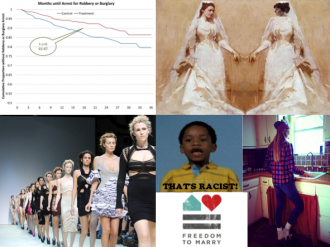
“Why Age May Be Hillary’s Secret Weapon” is the cover tease for a provocative little piece in the new issue of The Atlantic (June 2015) on women, aging, culture, and power in contemporary society. The piece starts by pondering why, in an evolutionary context, female humans live so long and what role(s) postmenopausal women fulfill for the species. This science-y context sets the stage for an essentially sociological attempt to explain why “people of both sexes may feel more comfortable with ambitious older women than with ambitious younger ones.”
The bulk of the article reviews a body of social scientific research on the biases women face in the workplace and society at large, and how some of these constraints may be mitigated as women get older and, especially, become grandmothers. The larger implication is that candidate Clinton and others are actively “playing the granny card” in positioning their public images against other stereotypes about women in positions of authority and power.
A lot of the work comes out of psychology (especially the experimental stuff) but some sociological contributions find their way in as well. Indeed, there is a quote from Stanford sociologist Shelley Correll, and even an in-print reference to the American Journal of Sociology! And the overarching conclusion or claim is more positive, more progressive than what usually comes out of such research: “…the current cohort of female eminences grises may herald an era when aging, for women, ceases to be an enemy, and even becomes a friend.”
The main problem is that I’m not exactly sure if there really is a new generation of powerful women turning age to their advantage. Is this a real phenomenon or social trend? Certainly, Hillary Clinton and Elizabeth Warren are making headlines in United States politics, and Angela Merkel as German Chancellor is historic. And I’m happy to see Janet Yellen and Christine Lagarde in positions of economic leadership (as Chair of Federal Reserve’s Board of Governors and Head of the International Monetary Fund, respectively). But who else are we talking about? Does four or five or even a dozen or two dozen such women—gratifying as that might be in and of itself—really constitute a cultural transformation? Even The Atlantic admits the sample size is small. It could well be that we are drawing some pretty big conclusions and implications out of some developments that are quite recent and fairly limited.
Perhaps I shouldn’t nitpick an article that is doing the honorable work of promoting and assessing the rise of women’s status and power in society and bringing social science research to bear on issues of public interest and significance. I am fully on-board with both aims. Still, the sociologist in me can’t help but want to know whether we are talking about real social shifts and trends or just some exceptional—albeit exciting—individual-level developments. The answer to that question has some very real implications for how we use the research and the meaning and significance we draw from all of this.



